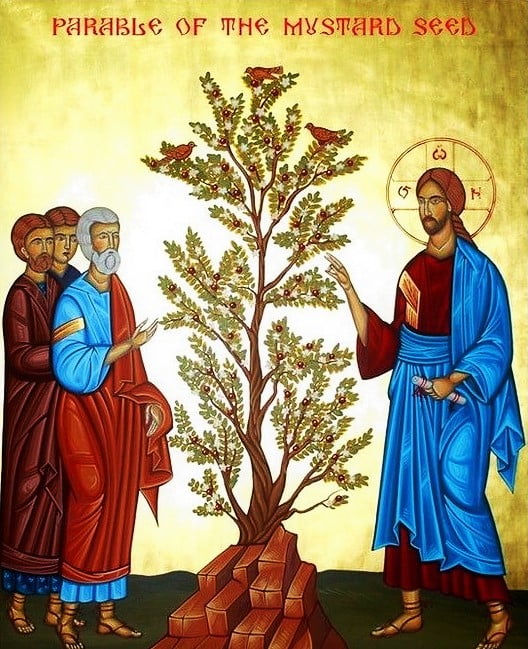MONDAY 3RD WEEK IN ORDINARY TIME GOSPEL, COMMENTARY AND READING. SIN AGAINST THE HOLY SPIRIT (Mk 3:22–30)

GOSPEL OF MONDAY OF THE 3RD WEEK IN ORDINARY TIME
Mk 3:22–30
“Whoever blasphemes against the Holy Spirit”
The scribes who had come from Jerusalem said of Jesus, “He is possessed by Beelzebul,” and “By the prince of demons he drives out demons.”
Summoning them, he began to speak to them in parables, “How can Satan drive out Satan? If a kingdom is divided against itself, that kingdom cannot stand. And if a house is divided against itself, that house will not be able to stand. And if Satan has risen up against himself and is divided, he cannot stand; that is the end of him. But no one can enter a strong man’s house to plunder his property unless he first ties up the strong man. Then he can plunder his house. Amen, I say to you, all sins and all blasphemies that people utter will be forgiven them. But whoever blasphemes against the Holy Spirit will never have forgiveness, but is guilty of an everlasting sin.” For they had said, “He has an unclean spirit.”
GOSPEL COMMENTARY FROM THE NAVARRE BIBLE, GOSPEL OF ST. MARK
22-23 Even Jesus’ miracles were misunderstood by these scribes, who accuse him of being a tool of the prince of devils, Beelzebul.
- This name may be connected with Beelzebub (which spelling is given in some codexes), the name of a god of the Philistine city of Eqron (Accaron), which means “god of the flies.”
- But [it] is more likely that the prince of devils is called Beelzebul, which means “god of excrement”: “excrement” is the word the Jews used to describe pagan sacrifices. Whether Beelzebub or Beelzebul, in the last analysis it refers to him to whom these sacrifices were offered, the devil (1 Cor 10:20). He is the same mysterious but real person whom Jesus calls Satan, which means “the enemy”, whose dominion over the world Christ has come to wrest (I Cor 15:24-28; Col 1:130 in an increasing struggle (Mt 4:1-10; Jn 16:11). These names show us that the devil really exists: he is a real person who has at his beck and call others of his kind (Mk 5:9).
24-27 Our Lord invites the Pharisees, who are blind and obstinate, to think along these lines: if someone expels the devil this means that he is stronger than the devil: once more we are exhorted to recognize in Jesus the God of strength, the God who uses his power to free man from enslavement to the devil.
- Satan’s dominion has come to an end: the prince of this world is about to be cast out. Jesus’ victory over the power of darkness, which is completed by his Death and Resurrection, shows that the light has already entered the world, as our Lord himself told us: “Now is the judgment of this world, now shall the ruler of this world be cast out; and I, when I am lifted up from the earth, will draw all men to myself” (Jn 12:31-32).
28-30 Jesus has just worked a miracle but the scribes refuse to recognize it “for they had said ‘He has an unclean spirit” (v. 30). They do not want to admit that God is the author of the miracle.
- In this attitude lies the special gravity of blasphemy against the Holy Spirit — attributing to the prince of evil, to Satan, the good works performed by God himself.
- Anyone acting in this way will become like the sick person who has so lost confidence in the doctor that he rejects him as if an enemy and regards as poison the medicine that can save his life.
- That is why our Lord says that he who blasphemes against the Holy Spirit will not be forgiven: not because God cannot forgive all sins, but because that person, in his blindness towards God, rejects Jesus Christ, his teaching and his miracles, and despises the graces of the Holy Spirit as if they were designed to trap him (cf. St Pius V. Catechism of the Council of Trent, , II, 5, 19; St Thomas Aquinas, Summa theologiae, II-Il, q.14, a.3).
“Therefore I tell you, every sin and blasphemy will be forgiven men, but the blasphemy against the Spirit will not be forgiven.”136 There are no limits to the mercy of God, but anyone who deliberately refuses to accept his mercy by repenting, rejects the forgiveness of his sins and the salvation offered by the Holy Spirit.137 Such hardness of heart can lead to final impenitence and eternal loss.
Catechism of the Catholic Church, n. 1864
Almighty ever-living God, direct our actions according to your good pleasure, that in the name of your beloved Son we may abound in good works. Through our Lord.
Collect prayer 3rd week in Ordinary Time
VIDEO COMMENTARY ON JAN. 25 GOSPEL
TOPIC: TOPIC: HAVE YOU GIVEN UP ON SOMEONE WHO HAS GRAVELY SINNED?
We encounter people who are dregs of society, condemned and banished. They may even be our friends, or used to be, because we have given up on them. But because of God’s divine mercy and His love that continues to abound, they can be like St. Paul, who was redeemed of his hatred and unbelief and, in today’s first reading (Acts 22:3-16), we witness his conversion story. Fr. Donald Calloway also had a similar conversion story. Let’s watch this video from the Knights of Columbus.[VIDEO – Poster Child of Divine Mercy:
Stay updated: subscribe by email for free TO OUR NEW WEBSITE www.catholicsstrivingforholiness.org (PUT YOUR EMAIL IN THE SUBSCRIBE WIDGET).
We are also in www.fb.com/Catholicsstrivingforholiness. Kindly help more people in their Christian life by liking our page and inviting your family, friends and relatives to do so as well. Thanks in advance and God bless you and your loved ones! Fr. Rolly Arjonillo


